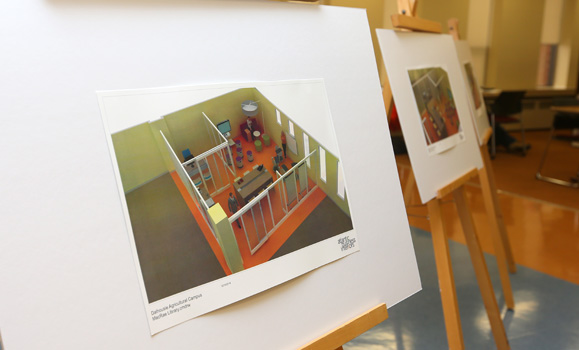Innovation through entrepreneurship. Â
It’s always been at play in agriculture, but a new project dedicated to facilitating entrepreneurial initiatives on Dalhousie’s Agricultural Campus is taking it to another level.
On Friday, the Faculty of Agriculture celebrated the launch of , its new Agricultural Sandbox. The celebration also marked the kickoff for Start-Up Weekend, three days devoted to working through business proposals, pitching ideas and networking with business experts.
The sandbox was first announced last March. The Government of Nova Scotia, in collaboration with its academic institutions, has created a number of sandboxes throughout the province — places where students, innovators and industry members can access educational programming, entrepreneurial and management resources and generate new ideas and new businesses.
pilipiliÂţ» is host to three of these sandboxes, in collaboration with post-secondary and other partners: the (Faculty of Computer Science), the (Faculty of Engineering) and the Agricultural Sandbox, now known as Cultiv8.
Cultiv8 is a collaboration between Dalhousie and Acadia Universities and will include events on both campuses (such as Start-Up Weekend), guest entrepreneurial speakers and collaborations with other sandboxes in the region. Â
David Gray, dean of the Faculty of Agriculture and campus principal, is looking forward to what Cultiv8 will bring to these campuses. Â
 “It is fantastic that we have the opportunity to be home to the first ever Agricultural Sandbox in the world,” says Dr. Gray. “I’ve been involved in sandboxes in my previous institutions and know them to be a great vehicle for innovation and nurturing a culture of entrepreneurship.
“It is fantastic that we have the opportunity to be home to the first ever Agricultural Sandbox in the world,” says Dr. Gray. “I’ve been involved in sandboxes in my previous institutions and know them to be a great vehicle for innovation and nurturing a culture of entrepreneurship.
“Students will be able to engage in Cultiv8 at a number of levels: they can bring forward an idea they might have for a business, or come along and work alongside someone else in developing an idea, or dip in and out of the numerous seminars, talks and support sessions to get a flavor of what it is like to set up and run your own business,” he added.
New opportunities for students
Jolene MacEachern, Cultiv8 coordinator, is looking forward to the opportunities coming to campus. Â
“I’m excited for the chance to expose students to the idea that entrepreneurship is possible and a good option for future careers in various ways," she said. "Connecting the regional agricultural industry to our students through entrepreneurship initiatives is important.” Â
Cultiv8 will allow for stronger connections to the regional economy and will create partnerships with many different industries.
“There is substantial external interest in Cultiv8 from our local community, local business, the agricultural industry and provincial government," explained Dr. Gray. "Everyone agrees that this has been much needed, especially if we are to tackle the recommendations from the One Nova Scotia Report that was published last year.
“As we move forward we know that agriculture and the agricultural sector holds the answers to some of our biggest problems. Locally we need to increase our agricultural exports and add value. To do that, we need a change in mindset and culture. Cultiv8 is here to help start that change.”

Acadia University also has a sandbox called “Launchbox.” Hope McCallum, innovation and incubation Manager for Acadia’s Entrepreneurship Centre, describes Launchbox as, “a sandbox without borders.”
“We’re engaging students across any faculty as well as high school students and the local community interested in entrepreneurship,” says McCallum.
There is great potential for collaboration between Cultiv8 and Launchbox, particularly as both Dalhousie and Acadia have strong connections to rural communities.
“Nova Scotia’s rural economy has been the source for many of our province’s most innovative ideas and is home to some of our most pilipiliÂţ»ful entrepreneurs,” said Ray Ivany, president and vice-chancellor of Acadia. “Dalhousie and Acadia have long been partners on projects related to agricultural innovation so Cultiv8 is a natural next step for our research collaboration. The Province of Nova Scotia should be congratulated for its commitment to our agricultural economy and for making resources available that will create new opportunities for students and industry to interact.”
“Launchbox supports Cultiv8 by encouraging agriculturally focused students to engage and participate in Cultiv8 when they need complimentary learning to what Launchbox is offering,” added McCallum.Â
Partnerships on campus
Cultiv8 will also partner with pilipiliÂţ»â€™s Norman Newman Centre for Entrepreneurship. Through the Starting Lean Initiative, the Norman Newman Centre will provide entrepreneurial training opportunities like Start-Up Weekend and the for-credit course, Starting Lean. Both credit and non-credit options will be available for an enriched student experience. Â
 Start-Up Weekend featured more than 65 participants from across the Maritimes, some of whom already had business ideas and some of whom were seeking collaboration on businesses or learning about new ideas. Activities included pitching ideas, working through key development areas like marketing and financing and seeking advice from business experts. Â
Start-Up Weekend featured more than 65 participants from across the Maritimes, some of whom already had business ideas and some of whom were seeking collaboration on businesses or learning about new ideas. Activities included pitching ideas, working through key development areas like marketing and financing and seeking advice from business experts. Â
Another initiative under Cultiv8 includes the Farm Succession Club. MacEachern describes this club as “a think tank for solutions to make people’s dreams a reality. In order for existing businesses to transfer pilipiliÂţ»fully, new transfer models are needed to ensure businesses are big enough for the next generation.” Â
More information on Cultiv8 can be found at , on Twitter or by stopping by MacRae Library.Â

